
Eupithecia is the largest genus of moths of the family Geometridae, and the namesake and type genus of tribe Eupitheciini. Species in the genus are, like those of other genera in the tribe, commonly known as pugs. The genus is highly speciose, with over 1400 species, and members of the genus are present in most of the world with exception of Australasia. Roughly a quarter of described Eupithecia species occur in the Neotropical realm, where they have an especially high species diversity in the montane rain forests of the Andes. The genus includes a few agricultural pest species, such as the currant pug moth, Eupithecia assimilata, which is a pest on hops, and the cloaked pug moth, Eupithecia abietaria, which is a cone pest in spruce seed orchards.

The wormwood pug is a moth of the family Geometridae. The species was first described by Carl Alexander Clerck in 1759. It is a common species across the Palearctic region as well as North America.

The common pug(Eupithecia vulgata) is a moth of the family Geometridae. It is a common species across the Palearctic region, including the Near East and North Africa. It ranges from the Atlantic coast of Ireland and Portugal across Europe, the Middle East and Central Asia to the Russian Far East (Priamurje) and Korea.

The grey pug is a moth of the family Geometridae. It is found throughout the Palearctic region. It is also found in North America. Since it does not place any special demands on climatic conditions, special caterpillar food plants, geological subsoil or the like it is a typical species of almost any Hochstaudenflur, where it occurs in the herb layer, in bushes and even on deciduous trees. It can be found on forest edges and hedgerows, on heath, in rocky places and wetlands, parks and gardens, as well as in villages and town centres.

The tawny speckled pug is a moth of the family Geometridae.

The juniper pug or juniper looper is a moth of the family Geometridae. The species was first described by Michael Denis and Ignaz Schiffermüller in 1775. It is found throughout the Palearctic and in the Nearctic.

Freyer's pug is a moth of the family Geometridae. The species can be found in Europe, east to the Urals, the Russian Far East, Kazakhstan and China. It is also found in North America.
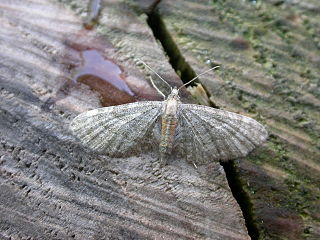
Eupithecia haworthiata, or Haworth's pug, is a moth of the family Geometridae. The species was first described by Henry Doubleday in 1856. It can be found in western, south and central Europe, Asia Minor, the Caucasus and east across the Palearctic to Amur. It occurs in the Alps up to 1800 meters, in the Apennines up to 1400 metres and in the Balkan mountains up to 1500 m above sea level.
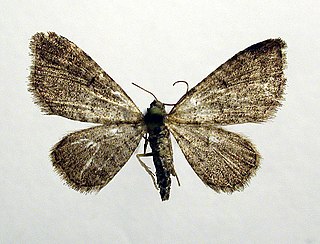
Eupithecia plumbeolata, the lead-coloured pug, is a moth of the family Geometridae. The species can be found all over Europe ranging to the Urals, then through Central Asia to Siberia and to Sayan mountains, the Altai and the Amur. In the Alps, the species occurs up 2000 metres above sea level and in the Pyrenees up to in 2400 metres.

Eupithecia insigniata, the pinion-spotted pug, is a moth of the family Geometridae. The species can be found in Europe and Turkey.

Eupithecia venosata, the netted pug, is a moth of the family Geometridae, first described by the Danish zoologist Johan Christian Fabricius in 1787. It is found across the Palearctic realm from Portugal and Morocco in the west to the Lake Baikal in Siberia and Afghanistan and Pakistan in the east.
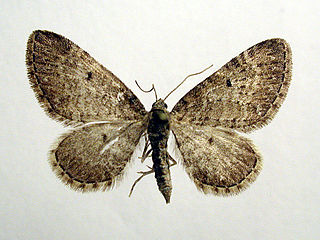
Eupithecia satyrata, the satyr pug, is a species of moth of the family Geometridae. It was described by Jacob Hübner in 1813. It is found from Ireland, through northern and central Europe east to all of Russia and central Asia and western Siberia to Tibet. It is also present in North Africa and North America.
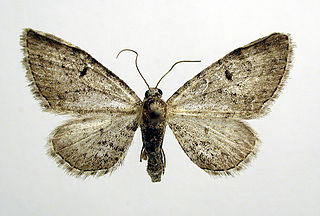
Eupithecia pimpinellata, the pimpinel pug, is a moth of the family Geometridae. The species was first described by Jacob Hübner in 1813. It is known from most of Europe to Morocco, Siberia, Kyrgyzstan, Altai, Mongolia.It primarily colonizes bushy places, forest edges, clearings, hedges, mountain slopes, embankments, railway dams and parks as well as semi-dry grasslands. In the Alps it rises to heights of 1800 metres.

Eupithecia distinctaria, the thyme pug, is a moth of the family Geometridae. It is found throughout Europe. It is also found in Iran. from the Iberian Peninsula through western and central Europe including the British Isles as well as further east as far east as far as Russia and Iran. In the north the range reaches as far as the southern Fennoscandia, to the south, where it is more common, it occupies the Mediterranean and Asia Minor. It is found primarily on warm, stony slopes and rocky structures as well as on sparse grassy areas with thyme mounds. In the Alps, it rises to heights of 2000 metres.
Dindica subvirens is a moth of the family Geometridae first described by Katsumi Yazaki and Min Wang in 2004. It is found in Guangdong, China.
Eupithecia graphata is a moth in the family Geometridae. bIt was described by Treitschke in 1828. It is found in most of southern and eastern Europe, as well as the Near East.
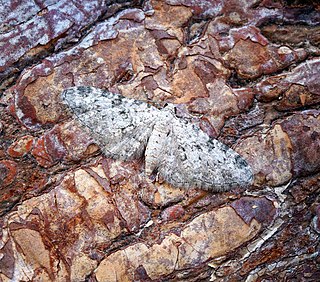
Eupithecia semigraphata is a moth in the family Geometridae. It is found from most of Europe to the Caucasus and Armenia. It is also present on the Canary Islands and North Africa.
Oxytate subvirens, is a species of spider of the genus Oxytate. It is endemic to Sri Lanka.














